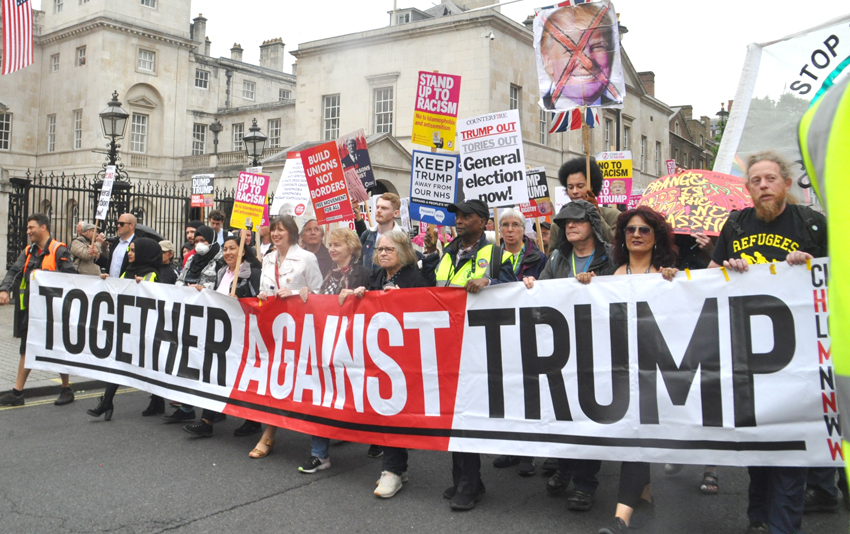
‘THIS SHOULD not be a debate about how we go forward with a no deal Brexit and at the same time offering up our precious, wonderful National Health Service to private American companies to come in and take it over,’ Labour leader Jeremy Corbyn said addressing the mass rally in Whitehall yesterday to protest against US President Trump’s state visit to the UK.
He was answering the US Ambassador to London who insisted the NHS should be ‘on the table’ in any US/UK future trade deal.
Corbyn declared: ‘We will not stand for that and we will strive with every last breath in our body to defend the principle of a health care system free at the point of need for everyone as a basic human right.’
There were dozens of demonstrations in towns and cities around the country, with organisers estimating 75,000 protesters turning out.
On the war of words between Trump and London Mayor Khan, Corbyn said: ‘I am very disappointed today, on the wonderful festival of Eid, that our Mayor of London, Sadiq Khan, has been attacked in the way that he has. I am proud that our City has a Muslim mayor, that we can chase down Islamophobia, anti-Semitism – any form of racism in our society.’
He concluded to cheers: ‘Together we can make a big difference, together we can change this world, together we can bring about that peace and justice, and by our demonstration here today we showed just how determined we, all of us, to achieve that better place and that better world.’
Meanwhile, Trump gave a joint press conference with the soon-to-be ex-Tory PM May.
May used her speech to launch an attack on Iran: ‘Today we discussed again the importance of our two nations working together to address Iran’s destabilising activity in the region and to ensure Tehran cannot acquire a nuclear weapon.
‘Although we differ on the means on achieving that, as I have said before the UK continues to stand by the nuclear deal, it is clear that we both want to reach the same goal.’
Trump said: ‘Today the Prime Minister and I discussed our thriving economic relationship. Both countries are doing very well and participated in a round table with industry and business leaders. I can say, probably the biggest business leaders anywhere in the world.
‘Our nations have more than one trillion dollars invested in each other’s economies. The United Kingdom is America’s largest foreign investor in our largest European export market.’
He concluded: ‘As the UK makes preparations to exit the European Union, the United States is committed to a phenomenal trade deal between the US and the UK. There is tremendous potential in that trade deal, I say probably two, or even three, times what we are doing right now, tremendous potential.’
Asked by a journalist: ‘As you hold talks with the current Prime Minister, the leader of Her Majesty’s Opposition has been addressing a protest rally against your visit in Trafalgar Square. He says that he is disappointed that you attacked the London Mayor, and criticised your record on refugees. What have you to say to him? And is this someone you could do a trade deal with?’
Trump answered: ‘He wanted to meet with me and I told him no. I don’t know Jeremy Corbyn, never met him, never spoke to him. He wanted to meet today or tomorrow and I decided that I would not do that.’
He was then asked: ‘Do you agree with your Ambassador that the entire economy needs to be on the table in a future trade deal including the NHS?’
Trump replied: ‘I think that we are going to have a great trade deal, yes. I think that we are going to have a great and very comprehensive trade deal.
‘Everything with a trade deal is on the table, NHS, and everything else, a lot more than that, everything will be on.’
May refused to rule out a fire sale of the NHS to US health companies, replying: ‘The point about making trade deals, is of course that both sides negotiate and come to an agreement about what should or should not be in that trade deal for the future.’